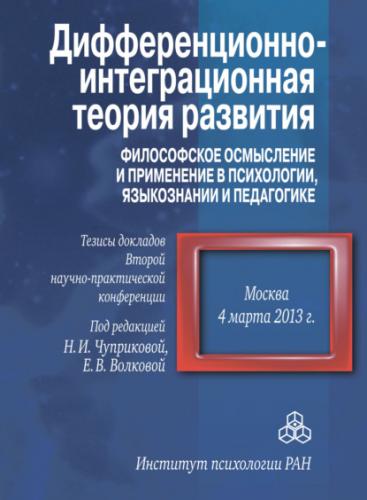Дифференционно-интеграционная теория развития. Философское осмысление и применение в психологии, языкознании и педагогике. Тезисы докладов Второй научно-практической конференции. 4 марта 2013 г., Москва. Коллектив авторов
новых систем и новых уровней, характеризующихся такой дифференциацией, которая не только не совпадает с тем, что имело место на предшествующих стадиях, но и часто не может быть понято как непосредственное продолжение того, что имело место ранее. То, что было дифференцировано ранее, может игнорироваться на новом уровне.
V. A. Lektorskiy (Institute of Philosophy, Russian Academy of Science)
Differentiation, complexity and stages of development
The conception of development as a movement from a non-differentiated whole to a differentiated and structured system corresponds to a lot of facts. But now the general notion of development can be specified and corrected in the light of new approaches in the frameworks of the theory of self-organizing systems (synergetics), the complexity theory and the idea of global evolutionism. In this context new problems arise, which are being heatedly discussed. One of these is the problem of complexity. It is possible to speak about the measures of complexity and the increase in complexity in the process of development. Complexity can correlate with differentiation. But it seems that the notion of complexity is more exact than that of differentiation, as the former can be measured. In the process of development there is not only a transition from a primary whole to differentiation (it usually happens in the framework of a single system), but also arising of new systems and new system levels. Relations between old and new systems can be various. New systems can supplant old ones. A new system level can arise on the basis of a primary system – as if its superstructure. Properties and processes of a higher level cannot be understood on the basis of knowledge of properties and processes of a primary level. Thus there is a case usually termed "emergence", i. e. the new cannot be reduced to processes at a base level. It is important that the higher level transforms the basic one and determines its functioning. Certainly, in the process of development a transition to a greater differentiation (greater measure of complexity) happens. But it is not an indivisible process: new system and new systemic levels have a differentiation which is not identical to a previous one, often a new differentiation cannot be considered as a simple continuation of the latter one.
И. А. Хватов (Московский гуманитарный университет), А. Н. Харитонов (Институт психологии РАН)
Эволюционные аспекты дифференционно-интеграционной теории развития: новые подходы к проблеме происхождения и филогенетического развития психики[1]
Обосновывается тезис о наличии психики у любой живой системы. У большинства организмов (прокариот, грибов и растений) психика составляет гомогенное единство с физиологией живых тел и обеспечивает ориентацию организма или колонии микроорганизмов внутри собственной системы. В ходе филогенеза происходит постепенная дифференциация собственно психических процессов от физиологических. На определенном этапе эволюции у отдельной группы живых систем возникает специфическая форма жизнедеятельности – поведение, связанная с голозойным питанием и активным передвижением. У этой группы живых систем, в дальнейшем выделившимся в самостоятельное царство – животные, – эволюция психики связывается с регуляцией деятельности, обеспечивая, таким образом, уже не только ориентацию во внутренней среде организма, но во внешней среде обитания. В ходе эволюции этого вида психики происходит дальнейшая дифференциация и интеграция формы и содержания психических образов. Однако имеется качественная специфика протекания этого процесса у разных таксонов животных, проявляющаяся в трех главных направлениях эволюции психики: ароморфозе, идиоадаптации и дегенерации.
I. A. Khvatov (Moscow University for the Humanities), A. N. Kharitonov (Institute of Psychology, Russian Academy of Sciences)
A new approach to the problem of origin and phylogenetic development of mind[2]
The authors elaborate the idea of the existence of mind in every living system. In most organisms (prokaryotes, fungi and plants) mentality makes a homogeneous unity with the physiology of the body and provides orientation of organisms, or colonies of microorganisms within their own system. In the course of phylogeny a gradual differentiation of mental processes from the physiological ones occurs. At a certain stage in the evolution of a particular group of living systems a specific form of life activity, i. e. the behavior, emerges which is associated with holozoic nutrition and an active movement. In this group of living systems, that further gave rise to an independent kingdom, the animals, the evolution of mind is associated with regulation of activities, thus ensuring not only orientation in the internal medium of the body, but also in the external environment. The evolution of this kind of mentality is further propelled by differentiation and integration of form and content of mental images. However, this process is characterized by qualitative specificity in different taxa of animals manifested in three main directions of the evolution of mind: aromorphosis, idioadaptation and degeneration.
Г. Г. Филиппова
Исследование поддержано грантом Президента Российской Федерации № МК-2816.2012.6.
The study is supported by RF Presidential grant # MK-2816.2012.6.
